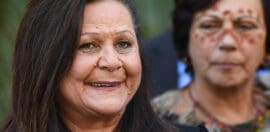Racism may contribute substantially to psychological stress for First Nations people

14 December 2022 at 5:25 pm
A ground-breaking study in The Lancet also points to the outcomes that are possible when Aboriginal and Torres Strait Islander people lead research into their communities.
New research in renowned medical journal The Lancet reveals the toll that racism takes on Aboriginal and Torres Strait Islander people.
The research found that racial discrimination “might contribute substantially to psychological distress” experienced by Aboriginal and Torres Strait Islander adults.
Everyday racial discrimination could explain nearly half — 47.4 per cent — of the gap in psychological distress they experience, compared to non-Aboriginal Australians.
The research appears in a special edition of The Lancet, called Advancing Racial and Ethnic Equity in Science, Health and Medicine.
It’s the first evaluation for any Indigenous population of the contribution of interpersonal discrimination to the population’s total burden of psychological distress, and to inequities between Indigenous and non-Indigenous populations.
Adjunct Professor @JanineMilera Mohamed calls on Aust govts, policymakers, orgs and individuals to honour the @closethegapOZ commitment and address racism. And for funding and focus on Aboriginal & Torres Strait Islander research/researchers @TheLancet @ANUPopHealth @Mayi_Kuwayu pic.twitter.com/cXa9Sorbwe
— Lowitja Institute (@LowitjaInstitut) December 14, 2022
It was co-authored by Lowitja Institute CEO Adjunct Professor Janine Mohamed, who said the findings highlight the need for significant action to address the interpersonal discrimination and structural racism directed at Aboriginal and Torres Strait Islander people.
“All levels of government have committed to work in partnership to eliminate racism under Priority Reform Three in the National Agreement on Closing the Gap,” Mohamed said.
“We are calling on governments, policy makers, organisations, and individuals to honour the agreement and to make real change. This requires a commitment to and concerted action on anti-racism at individual, institutional, community and structural levels.”
Building on what’s come before
The study was led by Dr Katherine A Thurber from the Australian National University (ANU) and builds on the Mayi Kuwayu Study, led by Professor Ray Lovett, at the ANU’s National Centre for Epidemiology and Population Health.
Lowitja Institute was one of the initial funders of Mayi Kuwayu, which is led by Aboriginal and Torres Strait Islander researchers and adheres to the principles of Indigenous Data Sovereignty.
The researchers conducted a cross-sectional analysis of data from Mayi Kuwayu, with baseline surveys completed between 2018 and 2022.
Everyday discrimination was measured using an eight-item measure, with racial discrimination being identified if the experience could be attributed to the participant’s Indigineity.
‘Population attributable fractions’, or PAFs, allowed the researchers to quantify the contribution that everyday racial discrimination made to the psychological distress gap between Indigenous and non-Indigenous adults.
Overall, the study found that the prevalence of psychological distress was 48.3 per cent amongst people experiencing everyday racism, compared with 25.2 per cent in people who did not experience everyday discrimination.
For the former, psychological distress prevalence was 49 per cent compared to 31.8 per cent for those not experiencing everyday racial discrimination.
“We know that when racism arrived in Australia in 1788, its impacts were devastating. They still are today. We see the distress in our communities and in our families to this day that results from colonisation and everyday racism,” Mohamed said of the findings.
“The potential harms from discrimination and racism must be recognised if we are to leverage policy reform that impacts the health of our peoples.”
Mohamed also pointed to the significant outcomes that can be achieved when Aborignal and Torres Strait Islander people lead research into their own communities.
Today @TheLancet special issue tells us what’s possible when Aboriginal & Torres Strait Islander peoples determine our own research, what can be done through trust & valuable allyship, and the need for well-funded research agenda led by us, data sovereignty: @JanineMilera Mohamed pic.twitter.com/EaAhJILdpV
— Lowitja Institute (@LowitjaInstitut) December 14, 2022
“We need an Aboriginal and Torres Strait Islander research agenda that is well-funded and supported by government so that we can continue to achieve excellence in research and improve outcomes in our peoples’ health and wellbeing,” she said.
The full research report can be read online.







